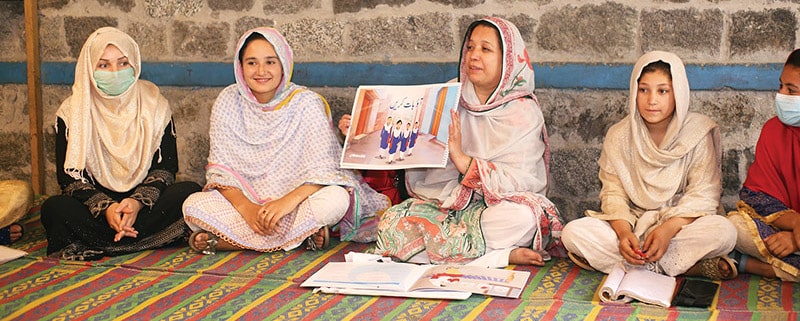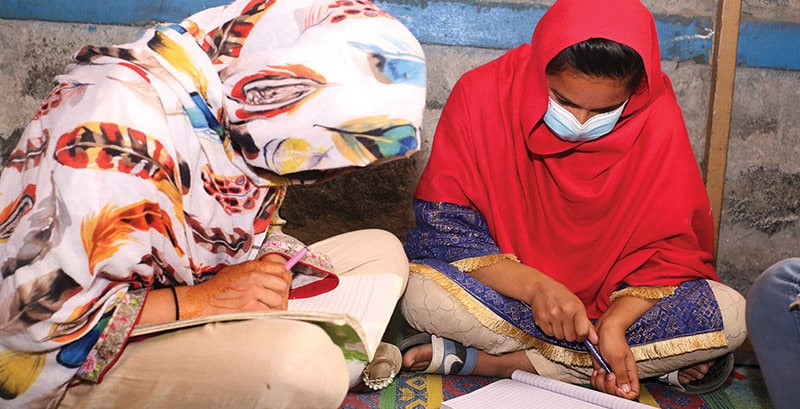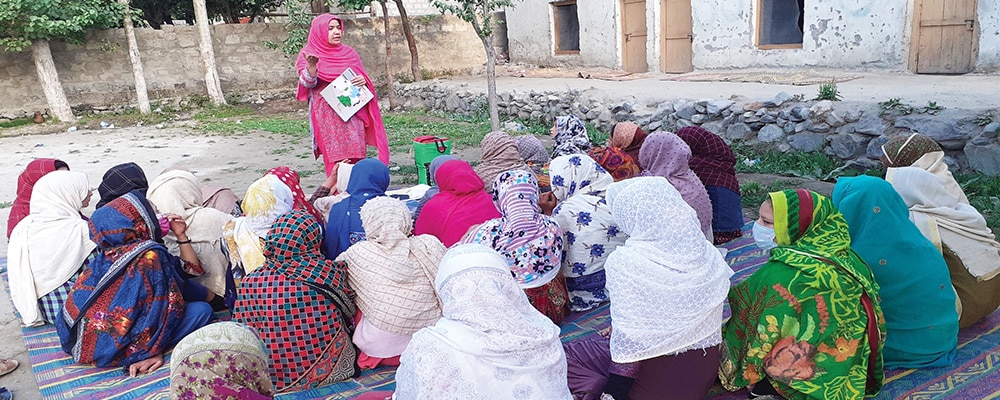The myths around menstruation helps girls get an education
By Molly Shapiro
In the remote mountain villages of Gilgit-Baltistan in northern Pakistan, young girls confront many challenges in their pursuit of an education—from poverty to lack of transportation to conservative cultural norms that confine girls and women to the domestic sphere. One barrier to education that is rarely discussed—yet highly disruptive to girls’ daily lives—is menstruation.
While menstrual bleeding is a fact of life for women and girls, a simple bodily function that requires proper hygiene and care, in these conservative communities, the topic of menstruation is taboo. There are many harmful myths associated with it that hamper girls’ ability to go to school, work, and participate in normal activities inside and outside of the home.
Girls and women do not talk about menstruation, and that leads to shame, misconceptions, and poor hygiene. Families restrict girls who have their period from going to school and doing chores around the house because they see them as unclean and impure. Girls are isolated and made to feel fearful about interacting with others during menses. Even when girls are allowed to go to school, their discomfort and worry about staining their clothes and their lack of access to proper sanitation facilities often make them choose not to attend at all.

Opening the lines of communication through trust
To address this critical issue, one of the Central Asia Institute’s partners in Pakistan has devised a program called Menstruation Health Management (MHM) that is changing not only general attitudes but individual lives. The goal is to dispel the myths around menstruation through open discussion and education so girls can gain critical knowledge and confidence, learn appropriate self-care, and be able to continue living their normal lives when they have their period.
One of the most important aspects of the MHM program in Gilgit-Baltistan, which was launched in January 2021, is to ensure that those conducting the training are trusted by the girls and their families. “We decided to choose someone from the local community, who understands their culture and norms and speaks their language,” explained Wajeeha Ahmad, program manager. “Girls and their parents feel more comfortable talking to someone in their own language.”
Khadija is a regional coordinator in Gilgit-Baltistan who’s been doing community work for more than a decade, so she’s experienced and knowledgeable about how to establish a relationship of openness and trust. However, dealing with the taboo subject of menstruation presented new challenges, even for her.
“The first time I was in the field, it was very difficult. There was so much hesitation and shyness about having a lady come into the village to talk about this issue,” said Khadija. Still was able to break the ice by first establishing a the village. “I told them about my own personal experiences so I could build a relationship and create a space for them to share their feelings and concerns.”
Once that barrier was broken, Khadija encouraged the mothers to talk to their daughters, and then began to have sessions with the girls themselves. “The sessions make the girls more confident to talk about these issues with their mothers and the instructors. They help them overcome their fears about going out of the house when they’re menstruating.”

Proper hygiene promotes health and instills confidence
While discussing the feelings and emotions that surround the topic of menstruation is important, it’s also crucial to educate girls about proper care and hygiene. This not only protects their health; it also gives them the security of knowing they can handle the days of bleeding without worrying about the embarrassment of leaking or spotting.
Part of the MHM program is to provide girls with kits that contain sanitary napkins. Girls are accustomed to using cloth pads that they make at home and then wash, which can be both ineffective and unhygienic. By introducing them to sanitary napkins, they learn about healthier, more effective ways to manage their bleeding.
Because buying commercial, disposable pads each month is not feasible for most low-income households, girls are taught how to make their own pads using cotton and cloth rather than cloth alone. They are also taught how to dispose of them properly. These frank discussions and hands-on instructions further give girls the confidence that they can go out in public and attend school without fear.
The program is embraced by both mothers and daughters
The response to the program has been overwhelmingly positive, with mothers and daughters openly discussing an issue that was once verboten. “The girls didn’t even talk about it amongst themselves,” said Khadija. “Now they talk about it with their younger sisters and cousins. It’s a huge success just having them talk.”
Khadija also sees improvements in girls’ health and hygiene. “Previously, they experienced more pain and infections, and they didn’t even understand why,” she noted. “Now they know what the pain is from and how they can both prevent it and treat it. We even provide hot and cold pads to help relieve the pain.”
And of course, one of the most gratifying results of the program is an increase in school attendance among girls. “Before they would prefer to just stay home and avoid leaving their houses. Now they have their kits with a zipper and pads, so no one can see,” said Khadija. “They have their manual outlining the three steps to making their own pads, so they can go out and go to school.”
According to program manager Wajeeha Ahmad, MHM instructors also talk to girls about recognizing inappropriate touching and harassment and how to deal with them. “The instructors are trained to recognize any concerning changes in behavior among the girls,” she said.
In addition to supporting the MHM program, Central Asia Institute works to help these communities build the toilets, latrines, and washing facilities schools need to accommodate girls and ensure they feel comfortable and safe attending school. It’s all part of CAI’s unwavering commitment to helping girls get the education they need to learn, grow, and prosper.






